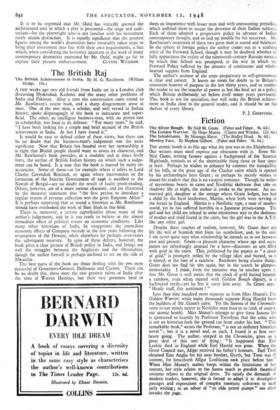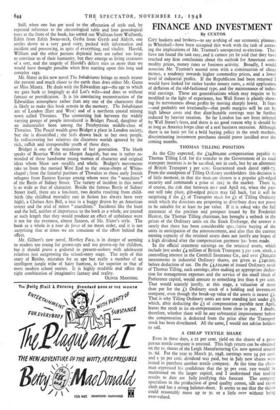Fiction
THE atomic bomb is to this age what the pox was to the Elizabethans. Our writers must need express, our obsession• with it. Even Mr. Neil Guru; writing fantasy against a background of the Scottish Highlands, reminds us of the abominable thing three or four times at least. Perhaps he wishes to enhance by contrast the tranquillity of his hills, or the great age of the Clachar cairn which is opened by his archaeologist hero Grant ; or perhaps he merely wishes to assure his readers that this is no escapist romance. Though he writes of mysterious beasts in caves and Neolithic skeletons that take on shadowy life at night, the author is awake to the present ' An un- married girl, daughter at the cottage where Grant lodges, has had a child by the local landowner, Martin, when both were serving in the forces in England. Martin is a Neolithic type, a man of another world, yet he has suffered horribly in a Japanese prison-camp.. The girl and her child are related in some mysterious way to the skeletons of mother and child found in the cairn, but the girl was in the A.T.S. like any other girl.
Despite these touches of realism, however, Mr. Gunn does not lift the veil of Scottish-mist from his symbolism, and, to the end, I am never quite sure what relationship he intends us to see between past and present. Grant--=a pleasant character whose age and occu- pation 'are refreshingly unusual for a hero—discovers an urn filled with gold in the cairn. This, publicised by the papers as " a crock of gold," is promptly stolen by the village idiot and buried, so it is hinted, at the foot of a rainbow. Rainbows being elusive things, Grant does dot filid his tfrn again, but in the search he glirapses immortality. I think, :from *the tentative way he touches upon it, that Mr. Gunn is well aware that the crock of gold, buried beneath a rainbow, even .when treated with Golden Bough dignity, is a haCkneyed myihyet lie lets it carry him away. As Grant says : " Heady stuff, this sentiment ! " Less than nine hundred years separate us from Miss Muntz's The Golden Warrior, while many thousands separate King HarOld from the builders of Mr. Gunn's cairn. Yet the Saxons of the Chronicles seem to our minds nearer to Neolithic man than to us (and, of course, our atomic bomb). Miss Muntz's attempt to give these Saxons life is sponsored so heartily by Professor Trevelyan that the critic who is not an historian feels the ground cut from under his feet. "This remarkable book," writes the Professor, " is not an ordinary historical novel " ; but it is a novel and, as such, I found it at first very heavy going. The author, steeped in the Chronicles, gives us a great deal of this sort of thing : " It happened that Earl Leofric died in England while Earl Harold was gone. When the Great Council met, Alfgar received his father's honours. Earl Tosti obtained East Anglia for his next brother, Gyrth, but Tosti was ill content, for henceforth Alfgar Leofricson took place before him." When Miss Muntz's matter keeps within the limitations of her sources, her style relates to the Saxon much as goodish theatrical costume relates to the original dress. To satisfy the demands of modem readers, however, she is forced to adapt it to descriptive passages and expressions of complex emotions unknown to such early writing ; so an odour of " ye olde petrol pumpe " too often invades the page.
Still, when one has got used to the affectation of style and, by repeated reference to the chronological table and four genealogical trees at the front of the book, has sorted out Wulfstan from Wulfnoth, Edith from Edith Swan-neck, Gytha from Gyrth and Aldyth, one settles down to a very good story, packed with information and incident and possess:ng, in spite of everything, real vitality. Harold, William and the other persons depicted here are rather too large to convince us of their humanity, but they emerge as living creatures of a sort, and the tragedy of Harold's defept stirs us more than we would have thought possible when first starting upon this long and complex saga.
Mr. Slater in his new novel The Inhabitants brings us much nearer the present and much closer to the earth than does either Mr. Gunn or Miss Muntz. He deals with the Edwardian age—the age to which we gaze back as longingly as did Lot's wife—and does so without fantasy or prettification. It is his convincing reconstruction of the Edwardian atmosphere rather than any one of the characters that is likely to make this book remain in the memory. The Inhabitants are of London (East and West) and of a northern coastal mining town called Thwaites. The connecting link between the widely varying groups of people introduced is Bridget Pascal, daughter of an industrialist born among the Presbyterian middle-class of Thwaites. The Pascal wealth gives Bridget a place in London society, but she is dissatisfied ; she feels drawn back to her own people. In rediscovering her relatives she discovers worlds ignored by the rich, raffish and irresponsible youth of those days.
Bridget is one of the mutations of her generation. The blurb speaks of Beatrice Webb or Margot Asquith, but one is rather re- minded of those handsome young women of character and original ideas whom Shaw saw steadily and whole. Bridget's movements take us from the monied West End to the sweat-shops of White- chapel ; from the forceful puritans of Thwaites to those early Jewish refugees from Eastern Europe among whom were the " anarchists " of the Battle of Sidney Street. The variety of incident in this novel is as wide as that of character. Beside the famous Battle of Sidney Street itself, there are a fox-hunt, two deaths resulting from child- birth (the childbed mortality rate in fiction has always been very high), a Chelsea Arts Ball, a race in a buggy drawn by an American trotter and the trial of minor " anarchists." Incidents like the hunt and the ball, neither of importance to the book as a whole, are treated at such length that they would produce an effect of unbalance were it not for the evenness, almost flatness, of Mr. Slater's style. The book as a whole is a tour de force of no mean order, and it is not surprising that at times we are conscious of the effort behind the effect.
Mr. Gilbert's new novel, Monkey Face, is in danger of seeming to readers too young for grown-ups and too grown-up for children, but it should prove a godsend to present-seekers with adolescent relatives just outgrowing the school-story stage. The style of this story of Bimbo, mistaken for an ape but really a member of an intelligent jungle tribe of hairy humans, is far superior to that of most modern school stories. It is highly readable and offers the right combination of imaginative fantasy and reality.
OLIVIA MANNING.



































 Previous page
Previous page